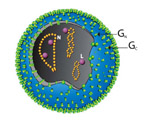After successful completion of the course (theory and laboratory), students should possess the modern scientific knowledge regarding viruses as distinct plant pathogens, their interaction with plants and their potential vectors, as well as the diagnosis and treatment of viral related plant diseases.
Also, students should be able to keep up-to-date on cutting-edge topics related to plant viruses and plant virus diseases.
The learning outcomes of the course are:
(a) Knowledge - Understanding:
(b) Practical skills in applying the main methods of identification of plant viruses.
(c) Development of the ability to distinguish the symptoms of viral diseases from other transmissible and non- transmissible plant diseases and to perform a correct diagnosis.
(d) Development of the capacity to design programs for the integrated management of virus and related plant diseases of different epidemiology.

